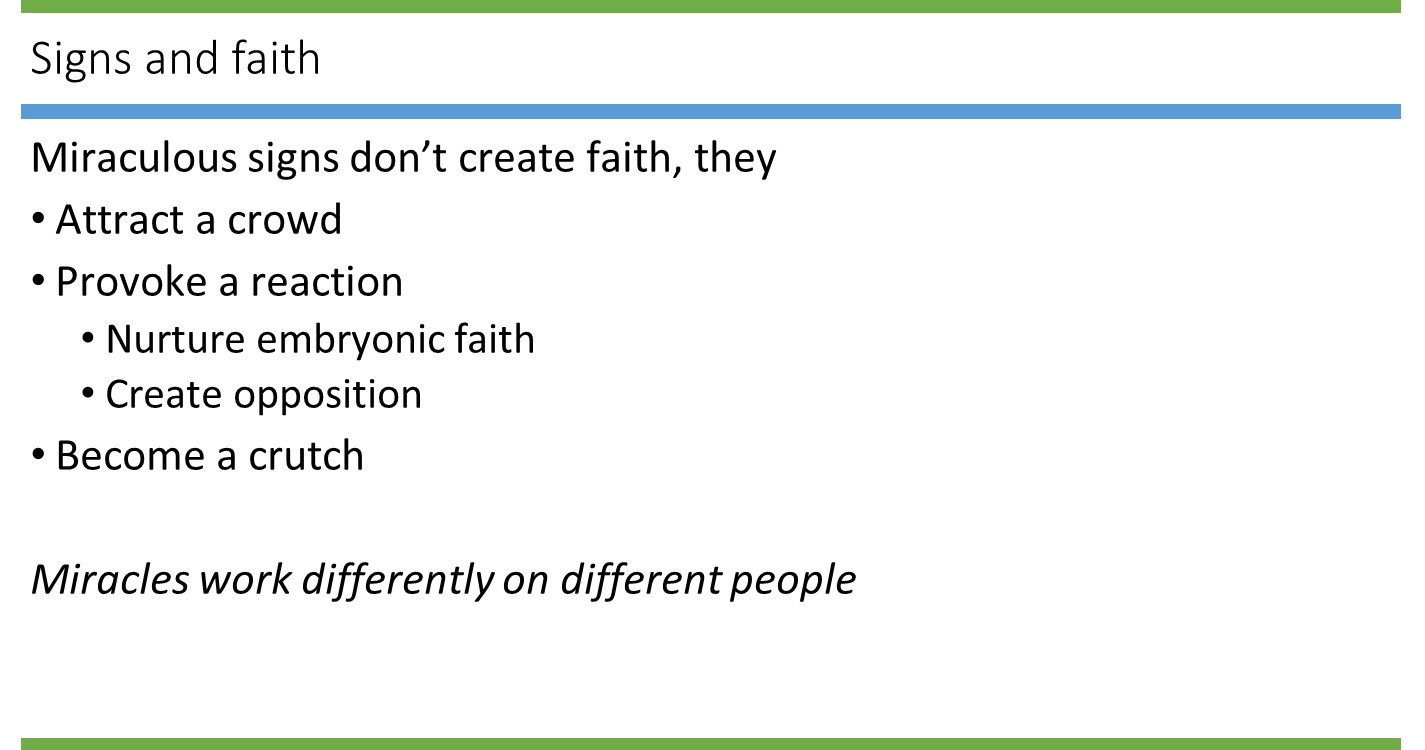[Last month, I republished the 2nd edition of the 1st book in my seven book series The Events of the End Times. The Fourth Kingdom: our place in God’s timetable builds a basic timeline according to biblical prophecy:
I have been pushing out excerpts of this book for the past two months.
I published my 2nd book in the Events of the End Times series at the end of January.
Both books are available at Amazon.com in hardcover. The images above have hyperlinks to the web pages for the books.
I will present excerpts of First Sign: beginning of the end for the next few weeks to give you a taste of it. I begin with the first chapter, but the real strength of both books come from the last few pages - the verse index. Each book references or quotes around 450 passages. That’s nearly a thousand verses. It’s all from the Bible, so you can learn what the Bible teaches.]
Danger of signs
Studying signs can lead to dangers for both the teacher and the student. I advise caution as we proceed. This topic comes pre-loaded with emotional baggage, misconceptions and expectations. If we stray from the foundation of God’s word, we will slip into superstition, cynicism and division. Careful Bible students exhibit maturity as they explore this matter.
Signs stimulate excitement. They promise something amazing, but we need to maintain our spiritual balance. Signs represent things beyond themselves – something more important. Just as the proper frame highlights its picture, so genuine prophetic signs point us to God. Don’t become so emotionally invested in “signs” that you miss what they portend.
Weigh the miraculous aspect of signs with their purpose. The Bible often combines signs with “wonders.” Wonders fall into a distinct category which relies on supernatural power to shock and awe observers (Acts 2:43; 8:13). Some signs exhibit the majesty of cosmic fireworks (Luke 21:11, 25, Acts 2:19). Yet even signs in the sky, like rainbows, follow a little rain. Very few biblical signs utilize the dazzling showmanship of a modern magician. God’s power results more from the sign’s prediction rather than pyrotechnics.
Slide 2 Dangers of signs
Some Christians find signs everywhere they look. These folks sound weird by attributing every situation and every resolution to the extraordinary. We must balance the normal against the unusual. To recognize signs, they must stand apart from the ordinary events of life (by prediction or fulfillment). Expect signs to occur rarely to maintain some contrast with normal events.
Most importantly, we must balance the impact and effect of signs. The spiritual effect of even the most miraculous signs has an upper limit. Many Christians imagine signs reforming the attitudes of their unbelieving friends and adversaries, but the Bible rarely attributes any lasting spiritual weight based on signs alone (Luke 10:13-15):
Then He began to denounce the cities in which most of His miracles were done, because they did not repent. “Woe to you, Chorazin! Woe to you, Bethsaida! For if the miracles had occurred in Tyre and Sidon which occurred in you, they would have repented long ago in sackcloth and ashes. Nevertheless I say to you, it will be more tolerable for Tyre and Sidon in the day of judgment than for you. And you, Capernaum, will not be exalted to heaven, will you? You will descend to Hades; for if the miracles had occurred in Sodom which occurred in you, it would have remained to this day. Nevertheless I say to you that it will be more tolerable for the land of Sodom in the day of judgment, than for you.” (Matthew 11:20-23)
These verses present two sides of the repentance coin. Tyre, Sidon and Sodom would have repented if they had experienced the signs performed by Jesus. God would have even delayed their judgment. Thus, we see long-term, positive impact of signs (translated as miracles in these passages). Signs may cause some to repent, but not everyone.
On the other hand, the Jews largely reject Jesus’ works. Signs had a negligible impact. The power of the Scriptures outweighs the influence of signs and wonders – even if someone rises from the dead (Luke 16:27-31).
Over-desire for signs steers away from faith
In other situations, the scribes and Pharisees demand a heavenly sign:
Then some of the scribes and Pharisees said to Him, “Teacher, we want to see a sign from You.” But He answered and said to them, “An evil and adulterous generation craves for a sign; and yet no sign will be given to it but the sign of Jonah the prophet” (Matthew 12:38-39)
“An evil and adulterous generation seeks after a sign; and a sign will not be given it, except the sign of Jonah.” And He left them and went away. (Matthew 16:4)
Jesus flatly condemns their request (Mark 8:11-12). He calls those who desire signs evil and adulterous. I take this as a reference to seeking other gods rather than cheating on their spouses. Over-emphasis on signs leads to idolatry where miracles replace God. It empowers us to judge God’s works.
How do we study biblical signs?
The words for “sign” appear over a hundred times in the Bible. I have performed a full word study of “sign” in preparation for this book (primarily using Strong’s # H226 and G4592). We will learn the difference between godly and deceptive signs. This study will help guide us as we analyze which signs initiate the end of this age.
Faith of signs
Miraculous deeds produce only a fleeting spiritual effect. Sure, His miracles attract many people to seek out and follow Jesus:
A large crowd followed Him, because they saw the signs which He was performing on those who were sick. (John 6:2)
Crowds flock to Him after He raises Lazarus:
For this reason also the people went and met Him, because they heard that He had performed this sign. (John 12:18)
Even King Herod of Galilee desires to see Jesus perform a miracle:
Now Herod was very glad when he saw Jesus; for he had wanted to see Him for a long time, because he had been hearing about Him and was hoping to see some sign performed by Him. (Luke 23:8)
Jesus’ deeds get the attention of friends and critics, common folks and leaders. The miracles of the apostles attract new crowds (Acts 8:6).
Nurture an embryonic faith
The Bible presents several examples of how signs interact with faith. His disciples increase their faith after witnessing His first miracle:
This beginning of His signs Jesus did in Cana of Galilee, and manifested His glory, and His disciples believed in Him. (John 2:11)
Similarly, Nicodemus demonstrates true faith by acknowledging the signs:
[This] man came to Jesus by night and said to Him, “Rabbi, we know that You have come from God as a teacher; for no one can do these signs that You do unless God is with him.” (John 3:2)
Nicodemus understands how signs confirm the legitimacy of Jesus’ ministry. Among believers, a miracle increases faith. The disciples already believe in Jesus sufficiently to follow Him. We don’t know what changed the heart of Nicodemus. I believe that he already had faith to believe (John 6:65).
Provoke a reaction
Others initially display the earmarks of faith in reaction to signs:
Now when He was in Jerusalem at the Passover, during the feast, many believed in His name, observing His signs which He was doing. (John 2:23)
It doesn’t take Jesus long to become exasperated over their need for signs:
So Jesus said to him, “Unless you people see signs and wonders, you simply will not believe.” (John 4:48)
Despite showing them more miracles than they have ever heard of in all the Scriptures, their faith goes only as far as His next miracle (Numbers 14:11).
John 6 describes the relationship between faith and signs in an extended plotline. A large crowd follows Jesus because of the amazing things He does for the sick. Finding themselves in an isolated place and realizing that they have no provisions to return to their homes, Jesus feeds the entire crowd using only five loaves and two fish (with plenty left over). The miracle had the usual effect, they believe in Him for a while:
Therefore when the people saw the sign which He had performed, they said, “This is truly the Prophet who is to come into the world.” (John 6:14)
Their belief never leads to surrender. They intend to use Him for their own desires. The people attempt to force Jesus to declare Himself king:
So Jesus, perceiving that they were intending to come and take Him by force to make Him king, withdrew again to the mountain by Himself alone. (John 6:15)
The crowd’s aggression causes Jesus to secretly cross the lake at night. By the end of His ministry, John summarizes the crowd’s faith:
But though He had performed so many signs before them, yet they were not believing in Him. (John 12:37)
They never utterly understand His message of repentance, forgiveness and eternal life. They only want deliverance from Gentile authority and freedom from the oppression of their own leaders. When the time of conflict comes, the crowds turn against Him. Only 120 souls endure to the Day of Pentecost.
Create opposition
Every miraculous sign forces a reaction from its witnesses – will you believe God now or continue to reject Him? The mere appearance of Jesus impels the fates (rise and fall) of many people:
And Simeon blessed them and said to Mary His mother, “Behold, this Child is appointed for the fall and rise of many in Israel, and for a sign to be opposed” (Luke 2:34)
For those who believe the message of God’s prophet, the sign brings joy and excitement. For those who desire to cling to their own ways, it becomes a source of irritation. The sign doesn’t produce faith. Instead, it reveals the existence of faith by the reaction of those who experience the sign.
The Jewish leaders observe the same miraculous signs as the crowds. Instead of believing in Him, the signs become obstacles to discredit Jesus:
The Pharisees went out and immediately began conspiring with the Herodians against Him, as to how they might destroy Him. (Mark 3:6)
So the people, who were with Him when He called Lazarus out of the tomb and raised him from the dead, continued to testify about Him. For this reason also the people went and met Him, because they heard that He had performed this sign. So the Pharisees said to one another, “You see that you are not doing any good; look, the world has gone after Him.” (John 12:17-19)
They lack the faith to accept His authority and teaching. Signs confront an unbeliever’s opposition to God, their ungodly behavior and their indecision concerning salvation. Signs remind the wicked to make a conscious choice to repent or turn their backs on God.
Eventually, this undeniable reality provokes a backlash rather than repentance. Miracles shake believers out of their lethargy while hardening the hearts of sinners. They resent the light which exposes their hypocrisy.
Slide 3 Signs and faith
Become a crutch
Back in John 6, the crowds find Jesus after His miraculous walk on the water:
Jesus answered them and said, “Truly, truly, I say to you, you seek Me, not because you saw signs, but because you ate of the loaves and were filled.” (John 6:26)
Jesus wants to give them eternal life, but they focus on their stomachs:
So they said to Him, “What then do You do for a sign, so that we may see, and believe You? What work do You perform? Our fathers ate the manna in the wilderness; as it is written, ‘He gave them bread out of heaven to eat.’ ” (John 6:30-31)
When they realize that Jesus could meet every physical need, they try to manipulate Him into perpetually feeding them. Jesus’ response argues against all forms of socialistic theology preached today. Jesus has all the tools necessary to permanently relieve their poverty – more than enough power and financial resources. He could have provided for them every day. He could have transferred that supernatural power directly to them. Or, He could have merely taken an offering and set up a food ministry.
Rather than build a platform to meet the physical needs of the poor, Jesus uses the signs to reveal their spiritual needs. We live by God’s word, not God’s miracle bread (Matthew 4:4 and Luke 4:4). Jesus never intends to make us physically or spiritually dependent on miracles.
Signs work differently on different people
Let’s learn how signs impact different people in diverse ways:
For indeed Jews ask for signs and Greeks search for wisdom; but we preach Christ crucified, to Jews a stumbling block and to Gentiles foolishness, but to those who are the called, both Jews and Greeks, Christ the power of God and the wisdom of God. (1 Corinthians 1:22-24)
Some accept miracles and others reject them (Acts 14:1-4). Similarly, the signs of tongues and prophecy touch different audiences in discrete ways:
So then tongues are for a sign, not to those who believe but to unbelievers; but prophecy, not to unbelievers but to those who believe. (1 Corinthians 14:22)
We have whole denominations of Christians addicted to signs. They long for thrill and excitement. Faith thrives on doing God’s will (James 2:14-17) – not observing miracles. Other Christians totally reject the idea of modern miracles. We need a balance just as the Apostle Paul uses both miraculous signs and arduous work to establish his churches:
The signs of a true apostle were performed among you with all perseverance, by signs and wonders and miracles. (2 Corinthians 12:12)
Focus on the biblical purposes for signs and remember the importance of perseverance in ministry. If miracles could change hearts, then God would send sign after sign to save the world. Salvation comes by faith in Jesus as Lord and Savior from hearing the gospel preached. Miracles might kick-start dormant faith but can’t create faith or sustain it long-term.







